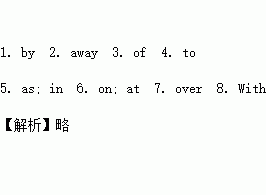题目内容
用适当的介、副词填空
1. Why not go ________ underground?
2. But the subway station is far ________.
3. So by the 1600’s Shakespeare was able to make use ________ a wider vocabulary than ever before.
4. In 1620 some British settlers moved ______ America.
5. English now is also spoken ________ a foreign or second language ________ South Asia.
6. It was based more ________ German than the English we speak ________ present.
7. So why has English changed ________ time?
8. Actually all languages change and develop when cultures meet and communicate ________ each other.
练习册系列答案
相关题目

